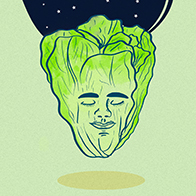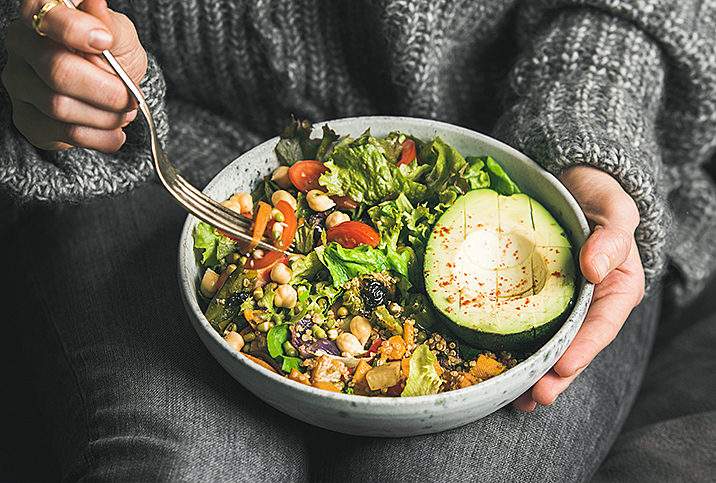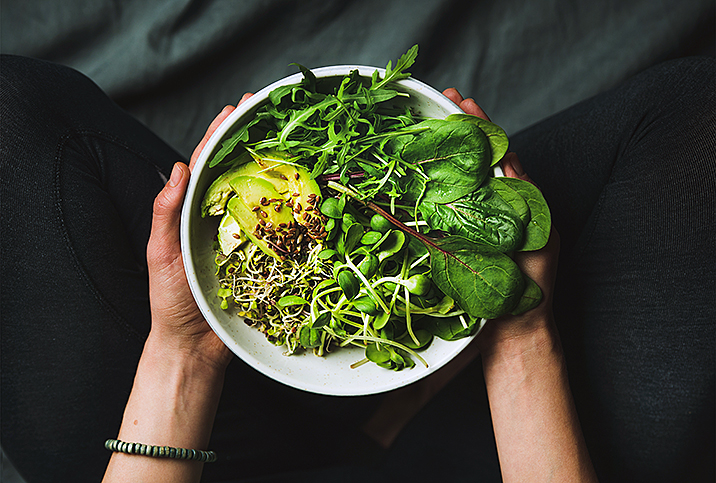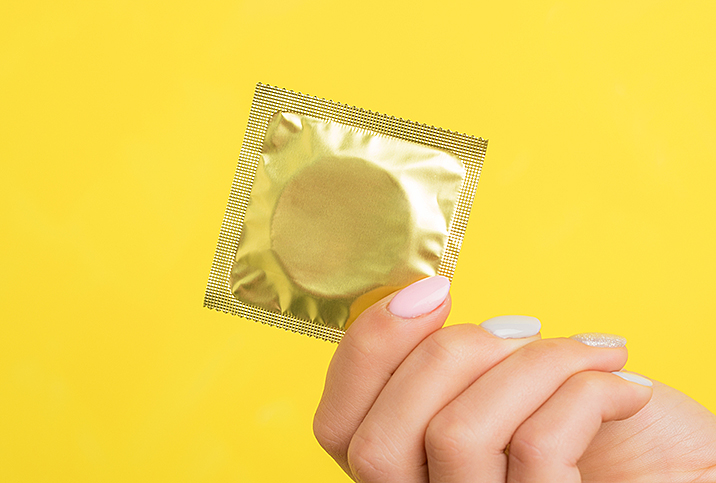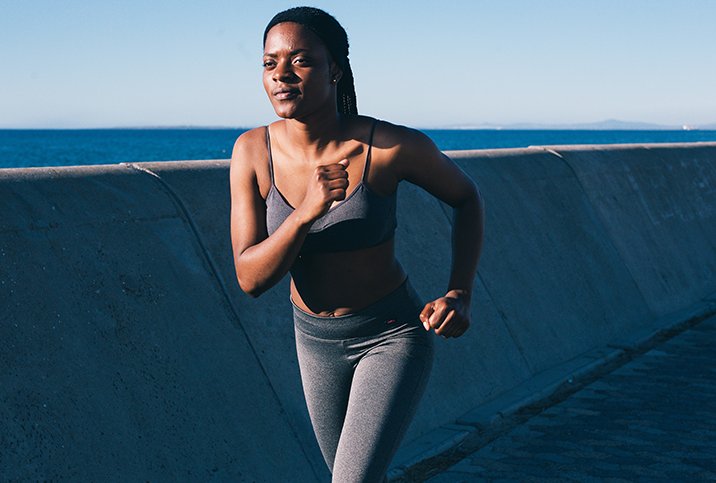Can Going Plant-Based Impact Your Menstrual Cycle?
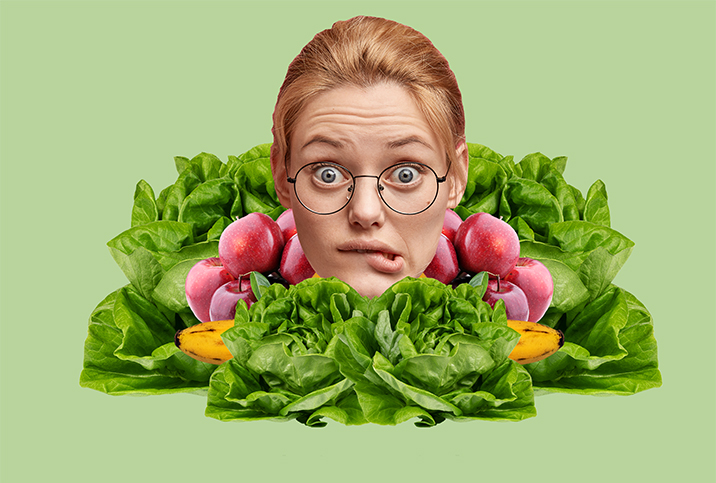
With vegan and vegetarian diets on the rise, it's natural to wonder how these diets impact our overall health—and reproductive health in particular. While vegetarian and nonvegetarian diets can both be healthy depending on your unique situation, there is a clear difference between the two—and some women are finding their period is affected by adopting a vegetarian diet.
While some new vegetarians report less cramping, lighter periods and less bloating, others report experiencing menstrual irregularities. A study published in the American Journal of Clinical Nutrition investigated if there is a link between vegetarian diets and menstrual disturbances.
The researchers did not find evidence that a vegetarian diet is associated with an increased risk of menstrual disturbances. Instead, they found certain factors influence the regularity of the menstrual cycle, which are sometimes related to adopting a meatless diet.
A healthy weight for easier periods
Bodies are beautiful at every size, but your body mass index (BMI) can impact your period health. Being severely under- or overweight can result in menstrual disturbances. Since plants are generally less calorie-dense than animal products, vegetarian and vegan diets are associated with having lower BMIs.
According to a study in The American Journal of Clinical Nutrition, the prevalence of overweight or obesity (BMI of 25 or higher) was 40 percent among omnivores, 29 percent among semivegetarians and vegans, and 25 percent among lacto-vegetarians (vegetarians who do not consume meat or eggs but do eat dairy).
This doesn't mean that if you eat a vegan diet you can't become overweight or obese, but, rather, that the diet is associated with lower levels of obesity. Studies indicate that obese women, compared with women of average weight, have greater odds of experiencing an irregular cycle. Women on a vegan diet have a less likely chance of being obese and in turn a lower probability of experiencing menstrual irregularities as a result of weight gain.
According to a small study published in the journal Obstetrics and Gynecology, the reduction in body weight some women experience on a low-fat, vegetarian diet is also associated with a shorter premenstrual syndrome duration and less period pain.
Nutritional deficiencies can also negatively affect your cycle
While a healthy BMI level may contribute to easier periods, you need to ensure you meet all of your nutritional necessities. Not eating enough food can negatively affect your hormone levels, and, in turn, your period.
According to Maude Morin, M.A.N., a registered dietitian in Ontario, it's important to eat enough calories to support the menstrual cycle. A sufficient diet not only supports your hormones, but also helps prevent symptoms of PMS such as fatigue, breast tenderness and mood swings.
"One of the more common causes of cycle disruptions is nutrient intake inadequacy," Morin explained. "In an effort to protect itself and reduce the amount of energy being used, the body can at times skip or stop the menstrual cycles. As such, correcting a poor diet is key."
In vegetarian diets, an entire food source is eliminated: animal protein. Considering plant-based sources of protein are generally less calorically dense, some people may have trouble eating enough on a vegetarian diet. "Generally speaking, eliminating certain food groups may contribute to menstrual cycle disturbances by causing overall reduced energy intake," Morin said.
"More specifically, when following vegetarian or vegan diets, animal protein foods are limited or eliminated. These food sources have some key nutrients that may play a role," she added. "Iron and zinc are especially important in maintaining blood health. The pausing of or delaying the menstrual cycle is one way the body can protect itself from iron-deficiency."
According to Morin, considering that vegan diets exclude more foods than vegetarian diets, it is more likely to see deficiencies in the diet. "For instance, many vegetarians will eat eggs and dairy products. These contain fats, iron and zinc, and are often fortified with vitamin D. All this makes it more likely to see a disturbance in vegan diets, if the client hasn't thought through the necessary changes and supplements to ensure overall good intake," she explained.
A vegetarian or vegan diet can be healthy, but to combat the risk of nutritional deficiencies, it's important to eat an intentionally well-balanced diet. Morin suggests vegans should assess their diet for iron and zinc intake or speak to a dietitian for help.
"Pairing iron-rich plant-based foods is a great place to start," Morin advised. "Consider eating iron-rich dark leafy greens, beans and lentils, and iron-fortified cereals with foods that have vitamin C to help your body absorb iron. Good examples of this include bell peppers, kiwis, citrus fruit and strawberries."
The role of soy
Soy is a source of controversy in the world of hormonal health. "Soy is highly contentious," confirmed Swathi Varanasi, Pharm.D., an integrative health expert in California. "Some people say don't eat soy at all—others say it's all about balance."
Soy contains phytoestrogen, an isoflavone that acts similarly to estrogen in the body. There is concern that soy can affect female hormone levels and, in turn, the menstrual cycle.
Some vegetarians and vegans may eat a soy-heavy diet, particularly if they are eating processed meat alternatives. Varanasi noted current research suggests eating soy is correlated with having a longer cycle. According to a 2009 meta-analysis on the topic, the intake of soy was found to reduce circulating FSH and LH hormones and increase menstrual cycle length in premenopausal women.
There is concern that soy can affect female hormone levels and, in turn, the menstrual cycle.
This increase in cycle length for people with soy-heavy diets is consistent across several studies. Research looking at cycle length in 200 premenopausal Singapore Chinese women suggested that women eating soy protein had a longer cycle by approximately one to two days.
There aren't many studies investigating the long-term effects of phytoestrogens on the menstrual cycle. If you are vegetarian or vegan and are concerned about eating soy, there are other high-protein foods.
"There are so many ways to get protein, even on a plant-based diet," Varanasi said. "Not everyone should get protein from soy, and you can get a large amount of protein from quinoa, beans, rice and leafy greens."
So, do vegetarians have menstrual disturbances?
Overall, there is no definitive answer on if veganism or vegetarianism causes menstrual cycle disturbances. However, if you are experiencing menstrual disturbances, whether as a vegan/vegetarian or a meat-eater, it's important to find out why.
"Remember that if you are experiencing symptoms of any kind, especially as someone with a period that is behaving irregularly or differently from your normal, your body is communicating with you," Morin said. "As important as diet and lifestyle can be in keeping a healthy menstrual cycle, disturbances can come from other underlying causes. If you are concerned, talk to your healthcare provider."







